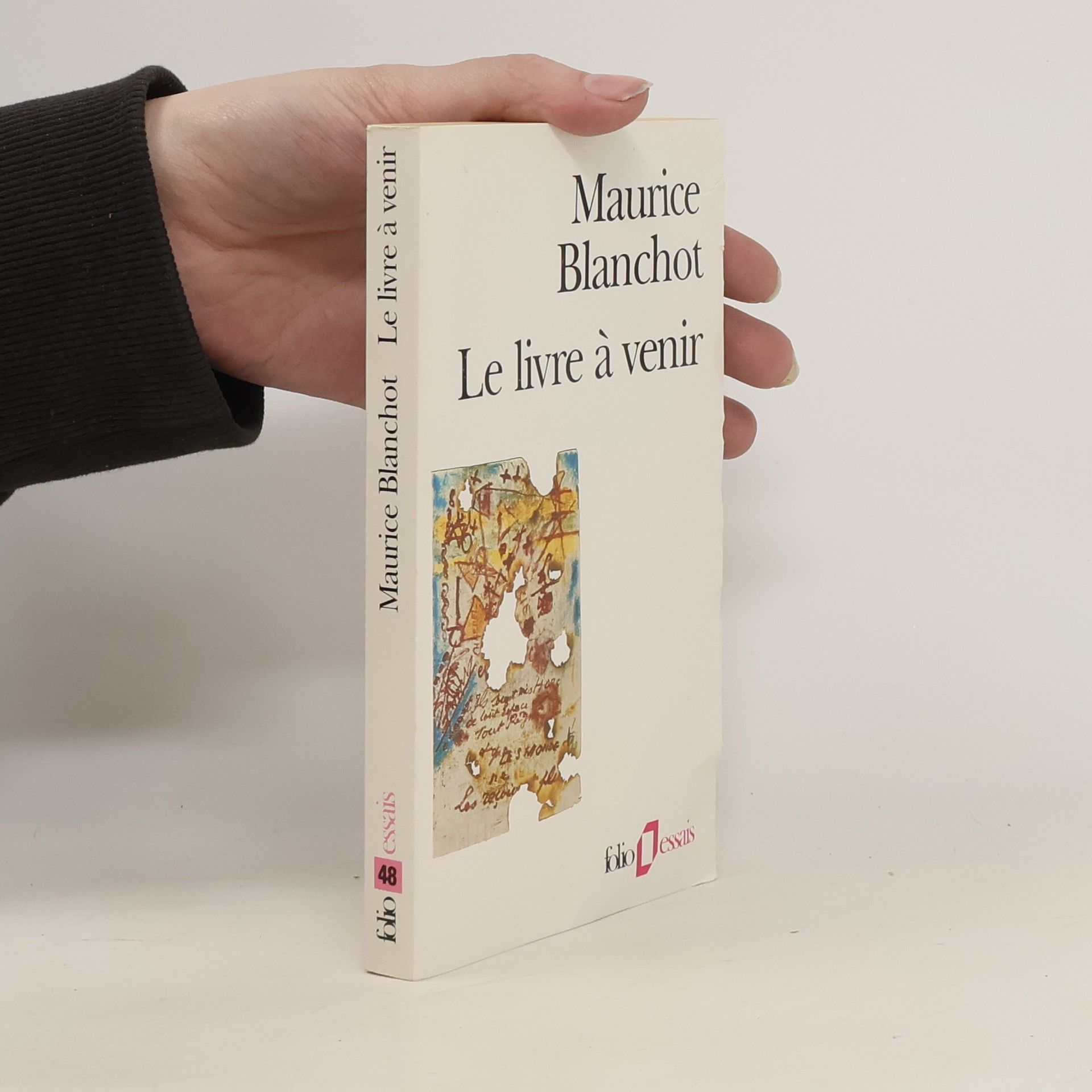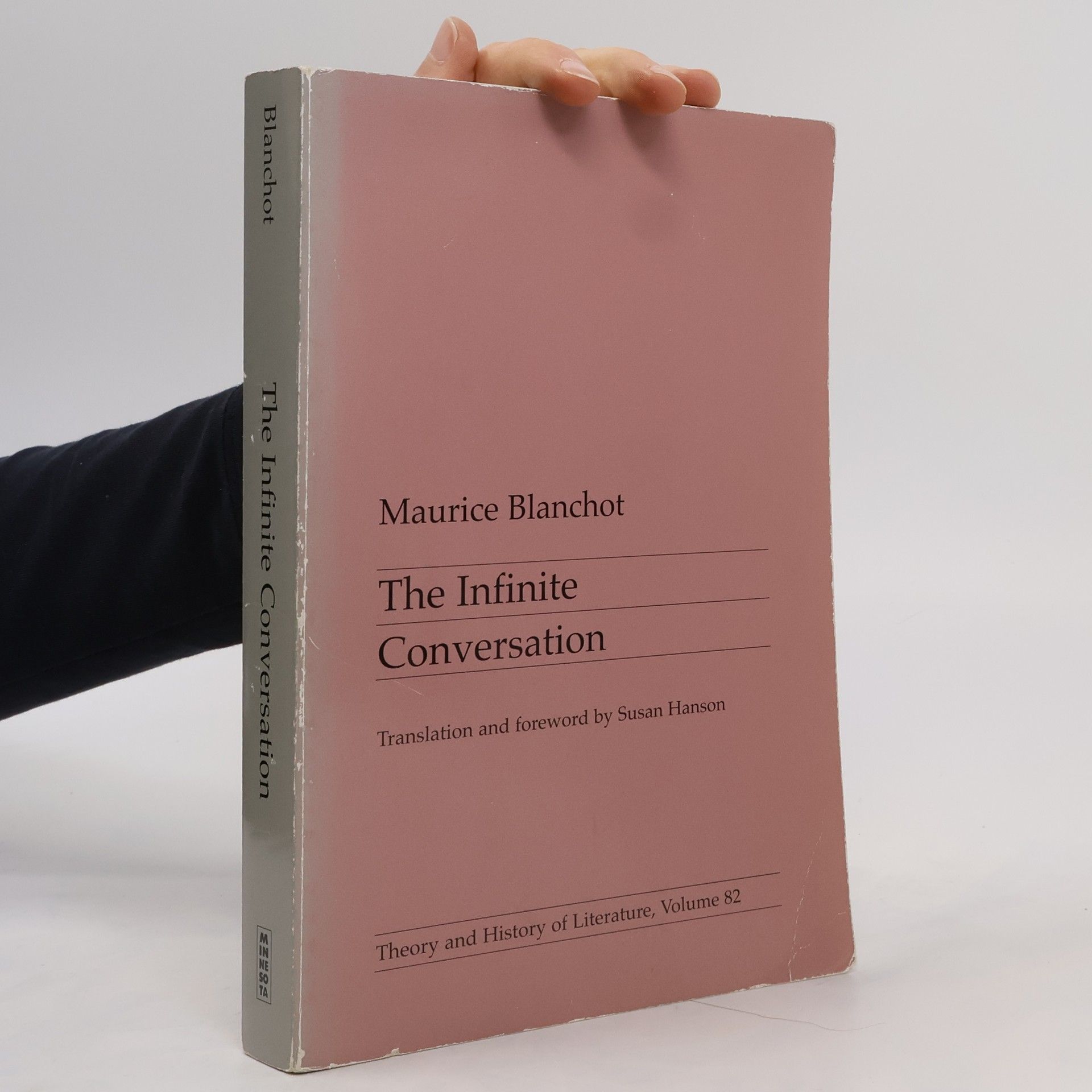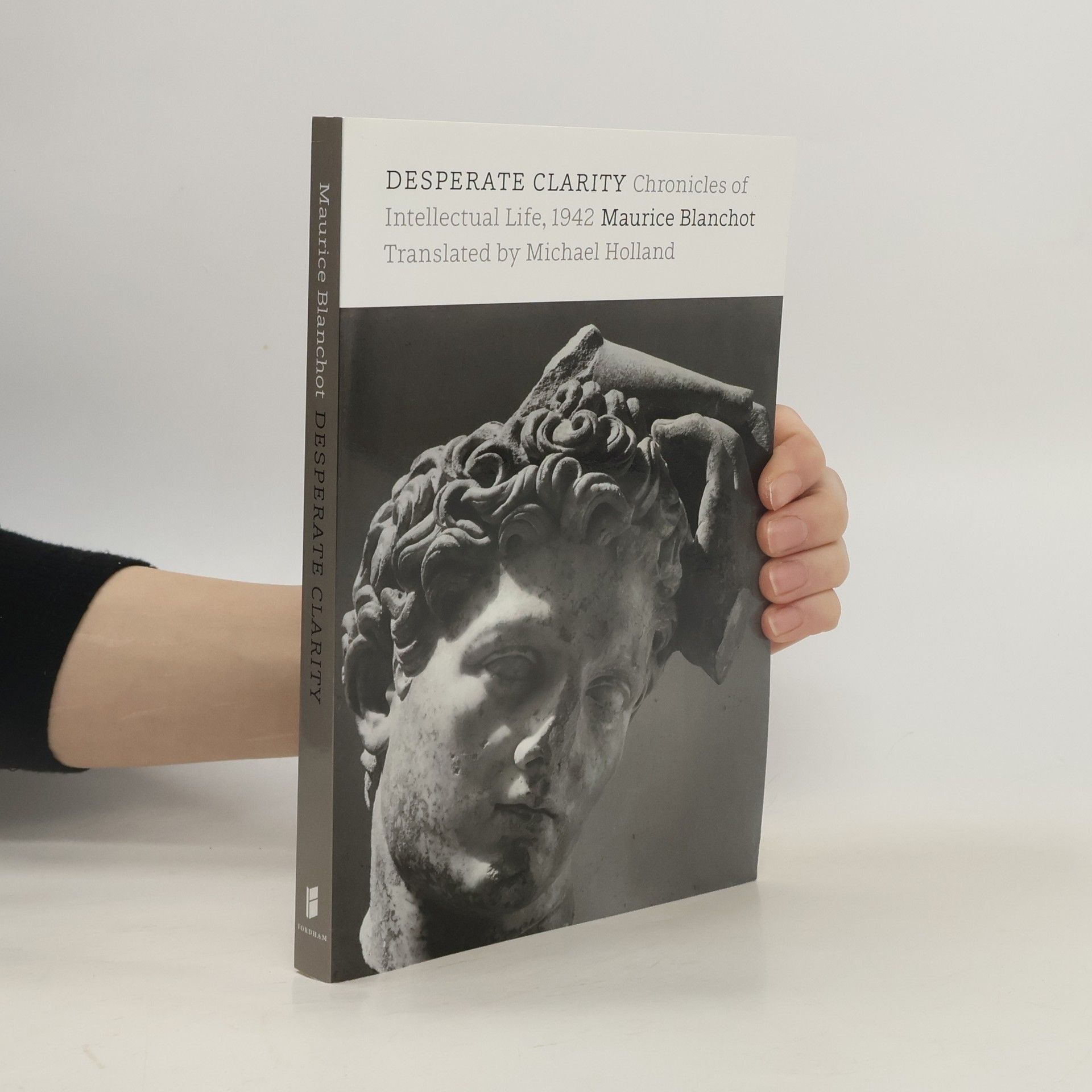Kilka słów od siebie. Właściwie nie utrzymywałem z Michelem Foucaultem osobistych kontaktów. Nie spotkałem go nigdy poza jednym razem, na dziedzińcu Sorbony w trakcie wydarzeń majowych 68 roku, bodaj w czerwcu czy lipcu (choć mówią mi, że go tam nie było) zamieniłem z nim parę słów, a on nie wiedział, z kim rozmawia (cokolwiek mówią potwarcy maja była to piękna chwila, gdy każdy mógł rozmawiać z każdym anonimowo, bezosobowo, jako jeden z wielu, bez innych uzasadnień prócz tego, że jest człowiekiem jak inni). Istotnie, podczas tych nadzwyczajnych wydarzeń mawiałem często: Ale dlaczego nie ma tutaj Foucaulta?, uznając tym samym jego siłę przyciągania i widząc puste miejsce, które winien był zająć. Odpowiadano mi wówczas słowami, które mnie nie zadowalały: Trzyma się na uboczu, bądź: Jest za granicą. Ale przecież przybyszy zza granicy było tam całkiem sporo, nawet z dalekiej Japonii. I tak się właśnie podówczas rozminęliśmy
Maurice Blanchot Book order (chronological)
Maurice Blanchot was a French philosopher and writer who explored the boundaries between literature and philosophy. His work is characterized by a distinctly modern approach that breaks down generic conventions. Although he began on the political right, his experience with fascism profoundly altered his thinking. Blanchot was deeply influenced by Hegelian interpretation and modern existentialism, which is reflected in his literary criticism and fiction.







Dieses Buch enthält eine Reihe von dicht aufeinanderfolgenden Reflexionen zu verschiedenen Autoren und Themen, die Blanchot größtenteils zwischen 1953 und 1965 verfasst und selbst zusammengestellt hat. In dieser Zusammenstellung entwirft er eine Idee des Schreibens, das sich nicht in den Dienst von Etwas stellt, sondern als langsam sich entfaltende Kraft nach und nach ganz andere Möglichkeiten der Thematisierung eröffnet, etwa von Gott, vom Selbst, vom Subjekt, von der Wahrheit und vom Einen. Dieses Schreiben schwebt scheinbar identitätslos über der Sprache und zielt als solches nicht auf ein Buch ab. Folgerichtig mündet der letzte dieser komplexen, oft paradox formulierenden Essays in der Abwesenheit des Buches. »Das unendliche Gespräch« gilt als eines der philosophischsten Werke Blanchots. Blanchot hatte einen tiefgreifenden Einfluss auf die Philosophie des 20. Jahrhunderts. Er war Wegbereiter für George Batailles, Emmanuel Levinas, Jacques Derrida, Gilles Deleuze, Jean-Luc Nancy und andere.
Wyrok śmierci
- 150 pages
- 6 hours of reading
?Pisanie jest po trosze umieraniem? ? hołdując tej zasadzie, Maurice Blanchot, jeden z wielkich samotników dwudziestowiecznej literatury, poświęcił się pisaniu. Wyrok śmierci, najsłynniejsza z jego krótkich powieści, ma pozory autobiografii, ale kiedy Blanchot pisze: ?Te wypadki przydarzyły się... číst celé
In den Werken Thomas Manns, so Blanchot, sei eine »wilde Trauer« am Werk, die spürbare Verzweiflung darüber, dass man der zerstörerischen Ironie der Moderne nur durch eine Verbindung der Kunst mit dem Dämonischen entgehen könne. Man hat sich angewöhnt, den Namen Maurice Blanchot mit einem Denken in Verbindung zu bringen, das die Errungenschaften, die die Thomas-Mann-Moderne repräsentiert, hinter sich gelassen hat. Ein um so verblüffenderes Bild dieses Denkens geben die in diesem Band versammelten Essays ab, die die Texte Thomas Manns und ganz besonders seinen »Doktor Faustus« aus den Gräbern der Literaturgeschichte befreien.
Desperate Clarity
- 240 pages
- 9 hours of reading
Provides a unique perspective on cultural life during the German Occupation, & offers crucial insights into the mind and art of one of the most original writers in the second half of the twentieth century
Der Allerhöchste
- 408 pages
- 15 hours of reading
Die Vermessung des Wahnsinns. Blanchots grosser Roman erstmals auf Deutsch Henri Sorge, gerade erst von einer Krankheit genesen, kehrt in seine Wohnung in einem Mietshaus zurück, das in eine Art Spital umgewandelt worden ist. Wahnvorstellungen bemächtigen sich seiner, die Beziehung zu seinen Mitmenschen wechselt zwischen Abscheu und Hörigkeit, Abhängigkeit und Abstossung, Grössenwahn und Minderwertigkeitsgefühlen. Unentwegt stellt sich Sorge Fragen über die eigene Existenz, gibt seiner Bewunderung der Welt und des sie regierenden Gesetzes Ausdruck. Ständig widerspricht er sich dabei selbst oder negiert das Gesagte. Le Très-Haut, 1948 erschienen, steht in einer literarischen Tradition mit Mallarmé, Kafka und Albert Camus' Roman Die Pest, der zeitgleich erschien. Mit der ersten deutschen Übersetzung kann nun ein grosser, ein erstaunlicher, ein monströser Text der literarischen Moderne entdeckt werden, in dem das verschlungene Verhältnis von Krankheit und Gesundheit, Ausgrenzung und Wahnsinn beinahe empathisch vermessen wird. Maurice Blanchot, der 2003 im Alter von 95 Jahren verstarb, ist einer der herausragenden französischen Schriftsteller und Denker der letzten 50 Jahre. Am engsten befreundet mit Georges Bataille und Emmanuel Levinas, hat er massgeblichen Einfluss ausgeübt auf Autoren wie Foucault, Deleuze, Derrida, Nancy, aber auch auf Dichter und bildende Künstler.
In Bezug auf die Philosophie sind Blanchots Schriften – als Essay, Literatur, Fragment – einer einzigen, sehr präzisen Forderung nachgekommen: eine unentwegte Arbeit an den Verführungen durch die philosophischen Grundformen zu leisten, der Dialektik, der Einheit, des Widerspruchs, an all dem, was die innerste, subtilste und wirkmächtigste Machart der Metaphysik und Ontologie ausmacht. Diese Arbeit hat nicht zu einem System von Begriffen, nicht zu Abhandlungen nach dem Gesetz der Deduktion geführt, sondern zu einer Folge von Interventionen mit der Sprache, in ihr, ohne sie – zu Interpunktionen eines Denkens von roher Eleganz und syntaktischer Schönheit, das zugleich dem Anspruch nachkommt, der Form zu entsagen, die Einheit zu zersetzen und sich von ganz anderem an seine unendlich differenzierte Grenze führen zu lassen. Die Sammlung bietet eine Auswahl von bislang nicht ins Deutsche übersetzten Texten aus den Jahren von 1940 bis 1990 zu Levinas, Nietzsche, Derrida, Hegel, Bataille, Heidegger, aber auch zu Heraklit, Pascal, Freud und Lacan. Sie macht zudem einige auf Deutsch bereits veröffentlichte, aber vergriffene Texte wie »Die wesentliche Einsamkeit« und »Die Literatur und das Recht auf den Tod« neu zugänglich.
Die andere Urszene
- 150 pages
- 6 hours of reading
Die Seele des Wolfsmanns zersprang in tausend Stücke, als ein Traum ihm den einst erblickten Akt der Eltern wiederholte. Ein Kind wird angesichts des bloßen Himmels der Abwesenheit Gottes, des nackten »Es gibt« gewahr. Jemand ohne Alter erfährt, gedächtnislos, ohne diese Erfahrung zu machen, die Verheerung des Außen. Ein anderer erwartet angstvoll einen Zusammenbruch, da ihm diese Furcht der einzige Modus ist, den bereits erfahrenen, aber nie erlebten Tod in Erinnerung zu rufen. Und viele arbeiten daran, das tyrannische Wesen, das sie als Kind einst waren und dessen Souveränität ihr Leben bedroht, abzutöten. In einer Konstellation, in deren Mitte ein Fragment Maurice Blanchots Rätsel aufgibt, bezeugen die Texte dieser Sammlung einen weitergehenden Entzug: Entzug des Erlebens einer Erfahrung, die dennoch insistiert, indem sie dem Leben ihre Schriftzüge verleiht; Entzug der Möglichkeit, mit dieser »anderen Urszene« – sei es im gesicherten Modus der Unmöglichkeit oder mit der Figur des Todes – in Denken und Gedächtnis in Beziehung zu treten. Sowohl die theoretische und praktische »Arbeit« der Psychoanalyse als auch die »Potentialitäten« des zeitgenössischen Denkens erfahren in dieser Szenerie ohne Ursprung die Zeichen dessen, was der Negativität, die sie an ihren Ursprung setzen, entgeht: Eine andere, sanfte, unnachgiebige Affirmation des Unmöglichen.
Maurice Blanchot se vždy distancoval od hlavních myšlenkových proudů své doby, surrealismu a existencialismu, později i od fenomenologie Martina Heideggera. Dvě studie, které tvoří tuto knihu, se zabývají druhdy opomíjenými a podceňovanými postavami z dějin literatury a filosofie, jejichž důležitost, ba neopominutelnost pro jakoukoliv moderní reflexi jazyka či racionality jasně vyvstala až po druhé světové válce.
Thomas der Dunkle. Erzählung
- 117 pages
- 5 hours of reading
Die Werke von Maurice Blanchot thematisieren Tod, Verlust und Alterität und beeinflussten maßgeblich die Literaturtheorien der Dekonstruktion und des Nouveau Roman. Sein Schreiben sucht die Realität des Todes radikal zu erfassen und vereint literarische Strömungen des 20. Jahrhunderts in einer surrealen Erzählweise. Die überarbeitete Fassung ergänzt seine bisherigen Werke.


